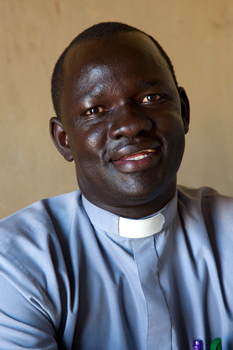
International leaders are currently meeting in New York to try to agree a treaty to regulate the international flow of arms. Rev Willy Akena from Northern Uganda writes movingly of the suffering endured by his people caused by the ready availability of unregulated arms, and calls for an end to arms proliferation.
Play your part by registering your support here:
http://www.oxfam.org.uk/get-involved/campaign-with-us/find-an-action/arms-treaty-hague
"For over twenty years Northern Uganda has been in a period of civil war between the rebels of the Lords Resistance army led by Joseph Kony and the government of Uganda under the leadership of President Yoweri kaguta Museveni Rev Willy Akena, Photo Walter Dirks.
In 2006 the people of Northern Uganda started experiencing a measure of peace, with the absence of gun shots. Kony, the leader of the LRA, and his troops agreed to talk peace and so a series of Peace meetings were held in different places including Uganda, Sudan and Congo.
I personally met Kony during the peace talks in 2006 and had a photo with him for the first time in my life. Being a former abductee and made to leave school, I wanted to see him face to face and tell him that he should release the women and children and allow them to come back home. He however refused to even release the children, but at least people were able to meet him and have dialogue. This was possible because at last the guns were silent.
Small arms have made our people orphans, homeless, widows and widowers, many lost their belongings and to date a number of people have not been able to recover from the pain and suffering caused by the war in northern Uganda. People with guns came and arrested children, women and men as well. The girls were often turned into sex slaves while the boys were turned into killing machines after being seriously indoctrinated.
At the Women Development Centre, one of the places where formerly abducted girls are being rehabilitated by the Diocese of Northern Uganda one can come face to face with those who suffered during the war.
One girl did not want to see any man, because the sight of a man would automatically bring back the life she led in the bush, where she would be forced into sex any time and made to become pregnant. Another girl I met a few days ago told me how she came back with two children from the bush, with no information about the father of these children. She got another man but this new husband does not want to see the two children she returned with from the bush, saying, I cannot look after rebels.
As a diocese we are trying to provide a holistic support to these people as they return to their original villages. We are trying to provide psychological support in terms of counselling, and practical support through the provision of seed and farm implements. We are also trying to work with the community to build community roads. Most of the water points got spoilt during the war and so we are trying to rehabilitate some of them. The diocese is also training the community in modern agronomic practices.
The diocese is however still meeting a number of challenges as far as rehabilitation and reintegration is concern. Land wrangles are rampant and some people who have money are grabbing land that used to belong to the community. We are working towards reconciling victims and the victimizers. We hold seminars for the healing of memories. Our sermons are full of messages of reconciliation drawn from our strong Biblical foundation.
Recently I discovered that the school dropout rate in Northern Uganda is the highest in the whole country - the long term implication is that many young people will not be able to get a proper education for themselves and their children, consequently they will easily be tempted to seek out arms to fight again. As a diocese we would therefore strongly advocate against small arms proliferation."
By Rev. Willy Akena - Bishops Chaplain/Information Officer Diocese of Northern Uganda. Thursday 19th July 2012.
